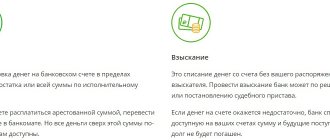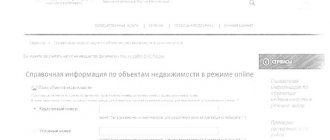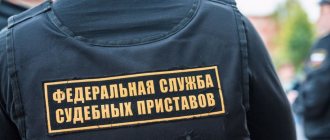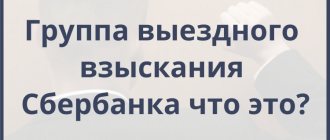Related Articles
Database of registered cars
12.03.2018
Claim against an insurance company for fire insurance compensation
12.03.2018
Conclusion of the commission in the act of acceptance of the transfer of fixed assets
12.03.2018
In case of unwillingness to provide the necessary documents from the case materials or in the absence of data on the withdrawal of money from the card, the injured person has the right to write a statement addressed to the senior bailiff with a demand to understand the current situation. The second way to obtain information about the nature of the write-off of money is to visit the official website of the FSSP. You can find out about write-offs in the section Data Bank on Enforcement Proceedings. As a rule, the text of the decision is hidden from a public request, but an interested person can find out in which territorial body the file is stored. In the future, all that remains is to visit the FSSP and find out the reason for the bailiffs writing off money from the Sberbank card.
Do bailiffs withdraw money from a credit card?
Funds can be written off only from the bank card of those debtors against whom enforcement proceedings have been initiated. It can be initiated by bailiffs on the basis of the following documents:
- court decision;
- a resolution on recovery or penalties from one of the regulatory government bodies;
- performance list.
The Federal Bailiff Service is obliged to inform the citizen about the initiation of enforcement proceedings at his official registration address. Therefore, if the bailiffs withdrew money from the card without notification, it is likely that they did not have correct information about the debtor’s location or there was a mailing error.
Is it possible to withdraw money before the bailiffs or bank withdraw it?
You must act before a court decision or court order comes into force. The bailiff is an unmotivated person. He doesn’t care whether the debtor pays his debt or whether an act of impossibility of collection will be drawn up. The collected amounts do not affect his already small salary; what is important to the bailiff is the number of enforcement proceedings executed and ultimately closed. It doesn’t matter what the result is - partial or full recovery, a statement of impossibility of return. In any case, it is important to do all this before freezing your accounts. If the accounts have already been frozen, I don’t know, but it’s still better to try to come to an agreement with the bailiffs than to do nothing at all. The court order can be canceled under Articles 128-129 of the Civil Code of the Russian Federation, motivating the application for cancellation by disagreement with the amount of the debt (this is possible even without details). The application can be brought in person to the court or sent by registered mail in Russia with notification. A court decision on a claim cannot be overturned, but it can be challenged.
Procedure for withdrawing money from the card
Once the debtor has been sent an official letter to initiate enforcement proceedings, he is given a five-day period to pay. If during this time he does not repay the debt, FSPP employees begin the collection procedure.
- The search for the debtor is carried out, information is requested from the territorial branches of the bank.
- It turns out that there are accounts with a positive balance.
- The debtor is sent a writ of execution with information that funds can be withdrawn from the card.
- A resolution is sent to the bank to write off funds to repay the debt.
Many citizens are concerned about the question of whether it is possible for bailiffs to withdraw money from a credit card. This will not be possible, since the funds on this card do not belong to the borrower, but are owned by the bank. The credit institution that receives a request from the FSSP, in turn, reports information specifically about debit accounts.
There are a number of important points in the procedure for writing off funds that you need to know.
- Bailiffs can select only one debtor account to write off. If FSSP employees want to change the account to be written off, they will need to revoke the old writ of execution and send a new one to the bank.
- If there is not enough money in the account for full repayment, it will be withdrawn as it becomes available.
- When bailiffs write off money from a salary or pension card, they can do this in an amount of no more than 50% of the amount received. Withdrawing large amounts is illegal, and in this situation you can contact the FSPP with a complaint and a certificate stating that the card is a salary or pension card. The only exception is the write-off of funds for alimony debt - in this case, a ratio of up to 70% is allowed.
- Funds can be written off both from accounts in rubles and in foreign currency.
Arrest, blocking of Sberbank salary card
As a result, the debtors find the document in their mailbox - from that moment the enforcement proceedings come into force.
- The next step is to request information about the debtor’s property: real estate, movable property, cash deposits, finances, vehicles and other things of value.
- Of interest are not only salary cards, but also savings books, credit cards and deposit accounts. The bailiff presents the writ of execution, after which Sberbank discloses all information about the debtor’s financial assets for the current period.
- Closing the enforcement case or continuing collections from the debtor’s property, depending on the amount of the debt.
- It should be noted that even if the debtor has activated the Mobile Bank service and received a notification that funds have been written off from his card, he will not be able to find out why the collection occurred.
You can return this money to your Sberbank card only if:
- The withdrawal was made in violation of the law.
How to find out why bailiffs withdrew money from a Sberbank card without warning? The owner of the bank account has the right to know the legality of this operation. Almost every person can detect that funds have been debited from their account. How to find out why money was withdrawn from the card? First of all, how do you know that they have been removed at all? notification via SMS to your phone if a mobile bank is connected, requesting a bank card balance through an ATM, checking the balance through your Sberbank personal account. The bailiffs withdrew money from the bank card. The credit institution will provide information regarding the basis for writing off the funds. If the money was withdrawn by decision of the bailiff, then you must contact the appropriate territorial division of the FSSP. The law previously allowed bailiffs to write off money from debtors’ bank cards, but this procedure was quite lengthy. But today the bailiff service is introducing into its work an automatic system for working with banks. This program allows bailiffs to write off money from debtors' accounts to pay off the debt. The leading banks of Russia are already subordinate to this system: Sberbank, Gazprombank, and cooperation with the banks VTB 24, Uralsib, MDM Bank, Bank of Moscow, Alfa Bank is next in line.
This procedure occurs as follows: after the court renders a verdict to collect money from the debtor, the case goes to the bailiffs. They, in turn, contact the bank and find out whether the debtor has financial means.
If there is enough money in the account to repay the debt, the bailiffs send documents to the bank about writing off the funds.
Provision of account information by banks
According to Article 87 of the Civil Code of the Russian Federation, banks can disclose private information about their clients’ accounts only to themselves, representatives of credit history bureaus, and certain supervisory authorities. These government agencies include the FSSP. Accordingly, they can obtain information legally.
The bank is not obliged to provide information about the amounts on the client’s card; the credit institution is only required to provide a list of valid debit accounts. Therefore, there are often cases when bailiffs choose to write off the option blindly. And the bank card turns out to be practically unusable and funds do not flow through it.
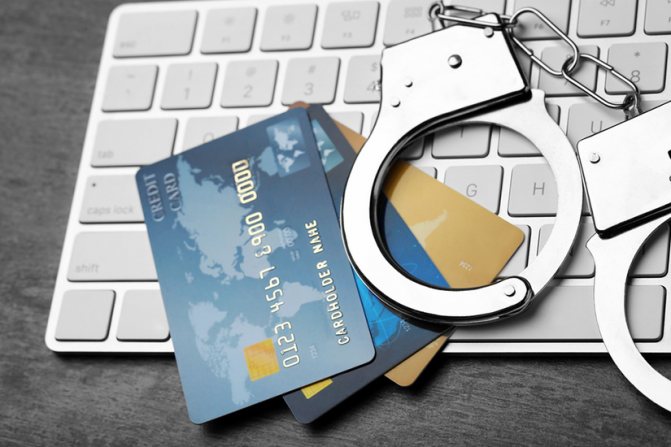
In what cases are bailiffs prohibited from withdrawing money from a card?
Not all funds can be written off by bailiffs legally. There are a number of restrictions for them. In particular, seizure cannot be applied to the following income:
- benefits paid in connection with the loss of a breadwinner;
- funds reimbursed for damage to health;
- benefits received for injuries and injuries resulting from the performance of official duties;
- compensation received by persons affected by various disasters;
- payments received to care for elderly and disabled persons;
- compensation for travel, purchase of medicines, purchase of vouchers;
- child support for persons under 18 years of age, which is paid during the period of searching for their parents;
- compensation payments from the organization, travel allowances;
- child benefits, maternity capital funds;
- one-time financial assistance from the budget;
- compensation for travel to the place of treatment.
Representatives of the FSSP do not always have information about what type of payments are received on a bank card. Therefore, cases when bailiffs, without warning, withdrew money from the card to which the funds indicated in the list are received, do occur. In this case, the debtor will have to independently prove the illegality of the write-off of funds by contacting the FSSP. To do this, you will need to provide appropriate confirmation.
How can I find out what the money was withdrawn for?
After it has become clear that the card was blocked or funds were written off by bailiffs, it is necessary to check for debts. It is best to immediately pay the debt to the bailiffs.
This can be done on the “Payment for Government Services” portal using a smartphone or computer and your bank card. Payments for fines, bailiff fees and state fees are available online here. To make a quick payment, you can always use our mobile application.
How to return written-off money
If the withholding of funds was unlawful, it is possible to return the money written off from the card by the bailiffs. The first thing you need to do is check with the bank about where the funds were written off. If employees confirm that money was withheld in favor of bailiffs, it is necessary to request information about the writ of execution. Next you will need to take the following steps:
- Prepare documents that confirm the illegality of the write-off (data that the card receives benefits, compensation or other payments for which write-offs are prohibited).
- Contact the FSSP and write an application, attaching a package of documents to it.
- Wait for the withdrawal of the writ of execution from the bank.
If the bailiffs leave the complaint unanswered, you can file a lawsuit. In case of illegal write-off of funds, the judicial system will be on the side of the debtor.
If the limit of write-offs on a salary card is exceeded, the victim will need to request from the employer a certificate of the amount of monthly charges, and from the bank information about the amount withheld by the bailiffs.
After this, with the documents and the corresponding application, the debtor can contact the FSSP with a request to stop write-offs in the amount of more than 50% of earnings (70% if we are talking about alimony).
The imperfection of the bailiff service is due to the heavy load on the system and the high level of bureaucracy. Therefore, errors often occur in the work of the FSSP. Accurate knowledge of the law and your rights will help you avoid problems and get your money back in case of unlawful deduction.
If you transferred alimony payments or child benefits to other accounts, for example, to a deposit account with interest in a bank, then the status of your funds changes. Consequently, the bailiff can foreclose on these amounts. For advice from a lawyer on how to return the money withdrawn by the bailiffs, watch the video from the second minute: Where can the funds be written off from? Bailiffs, due to their official duties, work closely with credit institutions and tax authorities. With the help of such interaction, bailiffs receive all the comprehensive information about the financial situation of the persons against whom enforcement proceedings have been initiated.
Money was withdrawn by mistake
If you are sure that you wrote off money from your Sberbank card by mistake, you must first of all contact the institution’s branch with a complaint (sample statement to the bailiffs), in which you indicate all the points in which the funds were written off. In addition, you need to write a similar statement to the bailiff service. Try to write a complaint in a business-like tone, indicating all legal norms, and supporting the application with the necessary documents (receipt for payment of fines)
After clarifying the issue with the bailiff service, you must contact the regional branch of the banking institution. You must have the following documents with you:
- a completed certificate from the Federal Bailiff Service indicating that you have no debts;
- notification of the service that the writ of execution was sent to the banking institution in error;
- application from the cardholder for a refund to the appropriate account.
Please note that the money will be received only after your application has been reviewed by the bank commission. In addition to filing an application with the FSSP, it is also possible to file a complaint in court. In addition to the corresponding application for compensation for damage caused, it is necessary to additionally provide copies of complaints to the bank and the bailiff service.
The bailiffs withdrew money from the card without warning
So, they do not have the right:
- come to the debtor at night, specified in legislative acts, this is the period from 22:00 to 6:00;
- perform any actions without having court orders in hand;
- describe the property that belongs to the debtor if he is not nearby;
- describe property the origin of which does not have documentary evidence of its acquisition by the debtor;
- confiscate the debtor’s only home, money in the amount of the subsistence level, a minimum set of food products, awards and orders, as well as items that are sources of income for the debtor.
Often the actions of bailiffs did not bring the desired result, so the institution of bailiffs was introduced in Russia, whose powers became significantly greater. Their competence includes studying the complete financial picture of the debtor’s condition.
What to do if bailiffs have withdrawn money from your card
The activities of bailiffs are reflected in the Federal Law “On Enforcement Proceedings”, as well as decrees of the President of the Russian Federation. What to do if funds are seized on a Sberbank card, our article will tell you about this. Powers of bailiffs in the field of collections from banking structures:
- conduct inquiries to the bank in order to identify personal information about debtors;
- seize cash deposits and other funds deposited in Sberbank;
- withdraw money from the debtor’s card to pay off debts on loans, alimony, customs duties and other debts;
- notify the borrower about the opening of enforcement proceedings and visit his apartment within the period of time established by law (from 6:00 to 22:00).
Accordingly, bailiffs have the right to withdraw funds from a Sberbank card even without the consent of the owner.
Finance withdrawn again
Due to the fact that the transferred money may arrive at an account, for example, the traffic police, after some time, situations arise when penalties have already been paid, and subsequently the bailiffs remove them again. To return the money, you must contact the senior bailiff who is in charge of your case and provide a receipt for payment of the fine. If the payment receipt has been lost, you can request a duplicate of the latter at the branch where the payment was made.
As you can see, despite the fact that initially the situation with money being written off from your current account may seem critical, but knowing how bailiffs withdraw money from a card, where to go in this case and how to return it, you will always find a way out.
Bailiffs withdrew money from a bank card
Ignoring the requirements will lead to the fact that the bailiff will not only collect the existing debt, but will also force the unscrupulous citizen to pay the costs incurred during the procedure. Even funds on the debtor’s credit card issued by one of the banks can be seized.
When enforcement is initiated, the debtor's money is first confiscated. FSSP employees can write off the capital stored in bank accounts and cards of the defaulter.
The type of account in which the capital is stored does not matter. Example of an SMS about debiting funds: Capital that is not in the bank can be withdrawn from:
- electronic wallets,
- debtor's debit accounts,
- funds.
This procedure is considered legal. FSSP employees know that most citizens prefer to store capital in a bank account or card.
Which banks do bailiffs usually not write off fines from?
And now we come to the main question of our article. To answer this, we monitored reviews and forums for most popular banks in our country and found out in which banks bailiffs do not write off money, and in which they write off money very often.
But keep in mind that the information here is based only on reviews from bank customers themselves, and not official data, so it may not be accurate. Moreover, the situation with such write-offs may change at any day, and it cannot be said that it is 100% relevant as of September 3, 2020.
In general, any bank is obliged to provide an answer about the availability of the debtor’s accounts and cards, as well as to comply with the requests of the bailiffs to impose blocking of money (for fines and other debts) and seizure of such accounts. But there are banks that ignore such requests, despite a substantial fine of 50 thousand rubles for this. And not all bailiffs bother with punishing banks for such neglect.
Banks from which, according to reviews, bailiffs do not write off money
| Bank | Number of reviews in the sample |
| Tinkoff [update 01/08/2018: isolated cases of write-offs have appeared] | 14 |
| Promsvyazbank | 9 |
| Citibank | 8 |
| MTS-Bank | 6 |
| Vanguard | 4 |
Can a bailiff withdraw money from a debtor’s account?
What to do if the bailiffs withdrew money from the card? In conclusion, let’s look at the instructions for action if money was debited from the card for no reason (it is not clear, to pay a fine or alimony):
- Visit a Sberbank branch and write a complaint about the actions of an authorized employee of the institution.
- The basis for writing a statement is the withdrawal of money without the client’s knowledge. As you know, all operations must be carried out transparently and not infringe on the rights of users.
- Having written a complaint about the work of the bank, you should prepare an application for the actions of the bailiffs (if the person has not received a copy of the writ of execution or other notice from the FSSP employees).
You will have to put in a lot of effort, but with the right approach you can achieve a full return of the written-off funds. The duties of bailiffs include monitoring and initiating enforcement proceedings.
Can bailiffs withdraw money without notice?
- copy of bank receipt No. 76767 dated February 22, 2018
03/26/2018 Sviridov S.S. (signature) If the bailiffs do not voluntarily return the illegally debited funds to you, you have the right to file a claim in court. The claim must indicate not only the amount collected by the bailiff, but also damages, moral damages, and remuneration for the lawyer who drafted the claim. The claim is filed at the place of registration of the FSSP department. Also, regarding the illegal write-off of funds by bailiffs, you have the right to write a complaint to the prosecutor's office.
Situations when FSPP employees have the authority to withhold funds from a bank card
If the defaulter is recognized as a debtor on the basis of a court order, the claimant has the right to apply with a writ of execution to the FSPP. Service employees will be able to forcibly collect the debt.
Notification of the opening of legal proceedings must be sent to the debtor so that he can repay all debt obligations on a voluntary basis.
The procedure for forced debt collection implies the following:
- Seizure of funds from the debtor's accounts, write-off of money and redirection to the account of the creditor.
- Confiscation of property, its sale to pay off debt.
- Imposing restrictions on travel outside the Russian Federation.
In addition, the defaulter will be charged an enforcement fee.
Types of debt obligations that bailiffs most often collect:
- For credit loans.
- Taxes and fees.
- Compensation for damage caused to health or life.
- Fines.
- Communal payments.
Expert opinion
Evgeniy Sergeevich Makarov
Arbitration manager with more than 10 years of experience
Almost any debt can be enforced. At the same time, there are cases when the applicant may not even contact the bailiff service. For example, collection of fines, penalties, alimony.
In order to seize funds from a debtor’s card, you do not need to ask for his consent.
Do bailiffs have the right to withdraw money from an account without notice?
Bailiffs withdrew money from your card So, if bailiffs withdrew money from your card, you need to contact a credit institution. The funds could be written off by the bank itself to repay a loan or other debt for services. If representatives of a credit institution report that the funds were written off at the direction of the FSSP, then it is necessary to identify the cause of the debt. How to find out why? How to find out why the bailiffs withdrew money from the card? To do this, you must personally contact the territorial division of the FSSP. You must take your passport with you. Bailiffs will check the enforcement proceedings and explain the reason for the debt. Another way is to check online using a data bank. In this situation, there is no need to appear at the FSSP. It is enough to have access to the Internet.
How to remove a seizure from a salary card imposed by a bailiff
- Debts for utilities will be written off directly from your bank card
- Seizure of salary card
- How to prevent bailiffs from debiting money from your card
- And from which cards of which banks can the bailiffs not withdraw?
- And from which cards of which banks can the bailiffs not withdraw?
- How to find out why the bailiffs withdrew money from the card?
- How to prevent bailiffs from withdrawing money from a card
can bailiffs withdraw money from a bank card src=” “=”” alt=”How to prevent them from withdrawing money from” Can bailiffs withdraw money from a debtor’s card? First, the debtor will be presented with a ruling on the possibility of repaying the debt within 5 days after the court decision, but in case of non-payment within this period, the bailiff has the right to begin enforcement actions to collect the debt.
Can bailiffs withdraw money from a bank card?
The bank serving the citizen does not matter either. Money can be debited from an account located in any institution. However, in a number of situations, bailiffs exceed their existing powers, forcing the bank to write off capital. We will talk about the procedure for debt collection, when executors do not have the right to take the debtor’s funds, and the legal regulation of the issue in this article. The content of the article
- 1 What laws regulate the activities of executive body employees?
- 2 How is capital withdrawn from the debtor’s bank card?
- 3 Are banks required to provide information about the debtor’s account?
- 4 Is all of the debtor's capital written off?
What laws regulate the activities of executive body employees? Collection of funds and property must be carried out taking into account the requirements of current legislation.
Losing money on a bank card can be an unpleasant surprise. In an attempt to find where exactly the funds from the card went, a person may find out that they were withdrawn by bailiffs as part of enforcement proceedings.
In some cases, bailiffs break the law and withdraw funds illegally.
Legality of bailiffs writing off money from a card
Bailiffs are the direct executors of court decisions and carry out penalties within the framework of enforcement proceedings, which are opened against an individual. The procedure for writing off funds is subject to the Federal Law “On Enforcement Proceedings” and decrees of the President of the Russian Federation.
In order to perform the functions assigned to them, bailiffs have the right:
- Request information from the bank to identify information about them.
- Seize deposits and money stored in banking institutions.
- Withdraw money from an individual’s cards to pay off debts on loans, alimony, taxes and other debts.
- Notify the debtor that enforcement proceedings have been opened against him.
- Visit his apartment and describe the property within the time frame established by law (from 6.00 to 22.00).
Thus, withdrawing funds from the debtors’ cards to pay off the debt is a legal way in the process of fulfilling the duties of bailiffs.
Bailiffs can impose a penalty on funds that are on the debtor’s card in the following cases: if a person has accumulated debt on bank loans (meaning unsecured loans), loans from microfinance organizations, fines (for example, for drinking alcohol in a public place), debts to utility services for services rendered, for accumulated arrears in alimony, in customs duties (for example, for a car brought into Russian territory).
The procedure for the bailiffs to write off money from the card
The procedure for writing off funds from a bank card involves going through the following stages:
- Receipt by the bailiffs of the writ of execution and sending a copy of it to the debtor using a postal transfer.
- Sending a request about the debtor’s property: not only about bank deposits and salary accounts to which the card is linked, but also about real estate, finances, vehicles, etc.
- Sending a payment request to the bank to collect funds from the card indicating the amount.
In this case, the debtor will not even have the opportunity to find out exactly why the money was collected from him. It is believed that the bailiffs have already notified the debtor about this by sending a writ of execution to him.
If funds are written off in full
Situations often arise when a person’s entire salary is written off. In this case, you need to take a certificate from your place of work about the amount of your salary and the method of receiving it. You need to come with it to the bailiff service office and write an application to reduce deductions.
There are cases when it is not possible to solve a problem through peaceful means, then you have to act through the courts. For example, if you need to reduce deductions by less than 50 percent.
You can also agree with the lender on an individual debt repayment schedule. Then he will be able to take away the writ of execution, and the bailiffs will no longer withhold money from wages.
Erroneous deduction of money from the card
Unfortunately, errors in the activities of FSPP employees are being identified more and more often. Often, money can be written off by mistake, for example, if you happen to be the namesake of the defaulter. If the money is written off by mistake, you need to fill out an application to the FSPP. And then proceed according to the instructions:
- Make a request for documents from a banking institution. Bank employees are required to provide all information about the bailiff, the number of the writ of execution, etc.
- Submit a petition to the bailiff about the erroneous withdrawal of funds. Attach evidence confirming the illegality of the write-off.
- Contact the court. If the bailiff ignores your demands, then you can seek the truth by contacting the senior bailiff, or directly in court.
What means cannot bailiffs withdraw from a card?
In some cases, withdrawing money from a card is illegal, even if criminal proceedings have been initiated against the person. Thus, bailiffs cannot withdraw funds for the following purposes from the card:
- Compensation received for compensation for injury to health , damage from disasters, loss of a breadwinner.
- Payments that are intended to care for elderly relatives and disabled people.
- Alimony.
- Travel allowances and funds intended to compensate for moving costs.
- Subsidies and maternity capital.
- Child benefits.
- Childbirth benefit.
- Sanatorium.
- Maternal capital.
- Insurance coverage within the framework of social insurance.
They have no right to leave a citizen without a means of subsistence.

